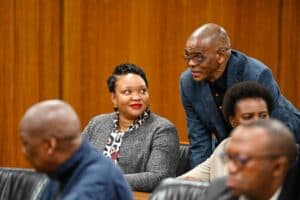Even if Judge Maya finally gets confirmed as the president’s choice, people will not forget how the process that got her there was a lynching party for her male opponents.

Gauteng Judge President Dunstan Mlambo provided the funniest moment in the Judicial Services Commission (JSC) interviews for a new chief justice that took place last week.
When asked by Julius Malema what his role was in the apartheid struggle, Mlambo replied: “Nothing. In fact, when the police came onto campus the one way, I ran the other way.”
The moment was funny and sad at the same time.
Sad because 28 years into democracy, the leader of the third largest political party still believes struggle credentials matter when it comes to selecting a chief justice.
What is underplayed is that it is people with impeccable struggle credentials that aided and abetted state capture, as per the report released by the last candidate interviewed by the JSC panel, Acting Chief Justice Raymond Zondo.
The JSC interviews were used by some of the commissioners not for the purposes for which they were intended: to open up to scrutiny the person who will be heading what is currently the most independent arm of the state, the judiciary.
The interviews were instead used to embarrass candidates they don’t like, as well as to discredit candidates. It would seem that it was forgotten that Zondo is acting chief justice or that Mlambo is head of the busiest division.
ALSO READ: ‘I’m not here simply because I’m a woman’: Judge Maya defends her standing for Chief Justice
They had to be embarrassed through innuendo at times, such as sexual impropriety rumours, even when a case or complaint hasn’t been laid with the relevant authorities.
They threw mud at the candidates they didn’t like in the hope that it will stick and that would automatically make the president choose that candidate.
The JSC could not protect the candidates because it doesn’t determine its own composition. When the composition of the JSC changed and members of the National Assembly and National Council of the provinces joined, the process of selecting judges was open to accusations of bias and political meddling.
Perhaps the saddest part of this process is that even though South Africa might come out of this process with its first ever woman chief justice of the constitutional court, the process that led to the recommendation of Judge Mandisa Maya as the next chief justice leaves a bitter taste in the mouth.
It’s not what Judge Maya was asked, but rather the spectacle that was made of the candidature of Zondo, Mlambo and to an extent Judge Mbuyiseni Madlanga.
Not only were they accused of being President Cyril Ramaphosa lackeys, but the insinuations went as far as suggesting that Zondo delayed release the report on state capture to give himself a better chance because anything critical of the president would prejudice him.
What if the process had actually focussed on Maya’s competencies instead of discrediting her fellow candidates? What if instead of insinuating sexual impropriety allegations against Mlambo, questions had been directed at his plans to modernise the court system and digitise court rulings?
What if the JSC was not turned into a mouthpiece of the previous administration by constantly asking candidates why they didn’t rule in former president Jacob Zuma’s favour?
There are ways to judge bias in a judge’s rulings, especially taking the rulings on appeal, instead of using the privilege provided by the JSC interviews to attack the judiciary.
If Judge Maya finally gets confirmed as the president’s choice, it will be one huge step in South Africa’s fight for gender parity.
What is sad, though, is that people will not forget how the process that got her there was a lynching party for her male opponents – and she does not deserve that.
Support Local Journalism
Add The Citizen as a Preferred Source on Google and follow us on Google News to see more of our trusted reporting in Google News and Top Stories.








